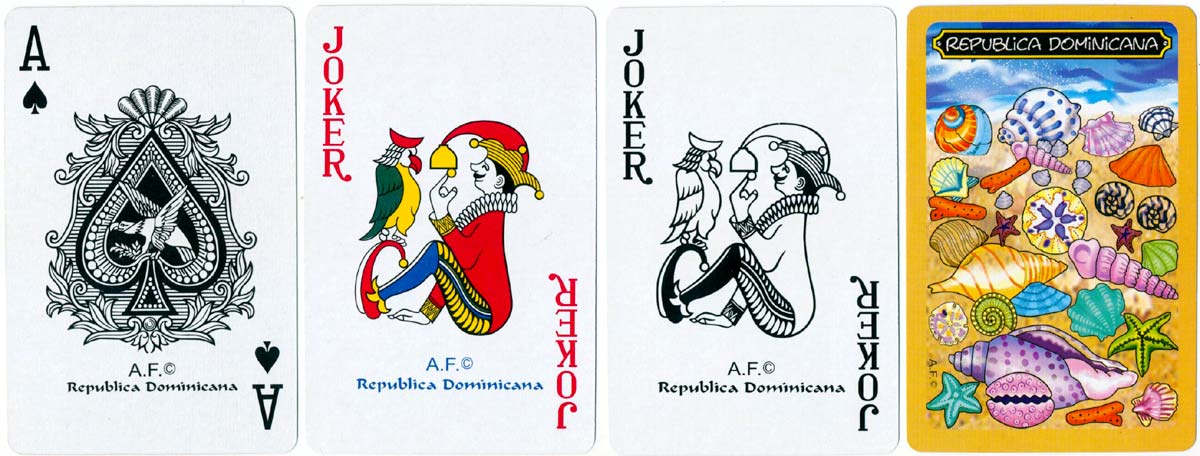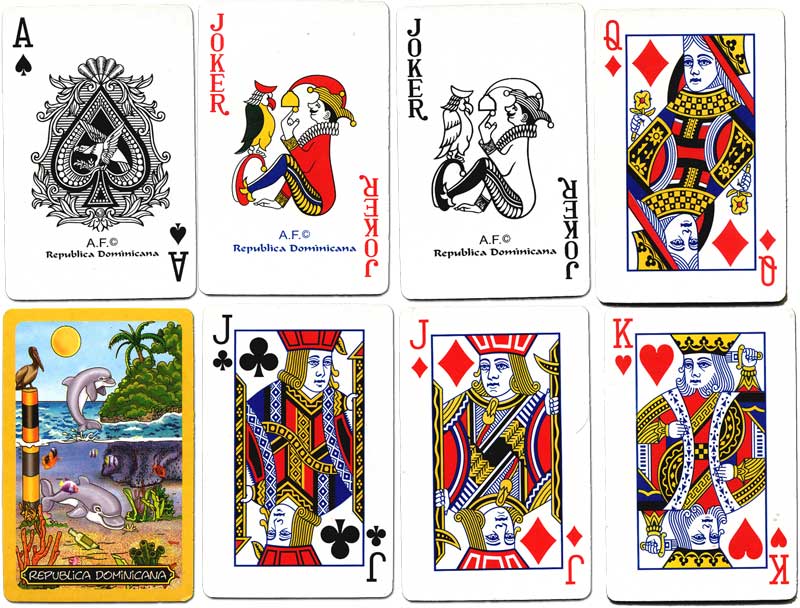Playing cards in the Dominican Republic

Playing cards in the Dominican Republic
Christopher Columbus discovered the island of Hispaniola in 1492, and it later became the major launching base for the Spanish conquest of the Caribbean, as well as the American mainland. The Dominican Republic occupies the eastern part of the island, whilst Haiti occupies the west.
The Spaniards were fond of gambling and brought their dice, cards and recreational games with them. Early 16th century Spanish playing cards would have been available in Santo Domingo, similar to those discovered in Peru, and Spanish playing cards would have been used for the next 250 years or longer, until French-suited cards were introduced.

Above: Spanish playing cards exported to new Spanish colonies from c.1550 onwards. Cards like these would have been in use for the first 200-300 years or so after the first Spanish settlers arrived.
Cards commonly found for sale today include the ubiquitous "Briscas" Spanish-suited playing cards, made in Spain, Hong Kong or China, and which turn up in souvenir shops in most Latin American countries, as well as tourist souvenir packs like those illustrated below.


Above: Souvenir playing cards from the Dominican Republic, unknown manufacturer, made in China. The ace of spades and jokers have the initials A.F.© and the plastic box has "Republica Dominicana" printed on the lid.

By Simon Wintle
Member since February 01, 1996
Founder and editor of the World of Playing Cards since 1996. He is a former committee member of the IPCS and was graphics editor of The Playing-Card journal for many years. He has lived at various times in Chile, England and Wales and is currently living in Extremadura, Spain. Simon's first limited edition pack of playing cards was a replica of a seventeenth century traditional English pack, which he produced from woodblocks and stencils.
Related Articles

Braulio Fournier
Baraja Nº 1 produced by Braulio Fournier, Burgos, c.1868.

Spanish pattern by Eugène Boisse
Spanish pattern published by Eugène Boisse, Bordeaux.

QAIPES – cartas españolas
Spanish-suited cards made in China inscribed “QAIPES” and “BAIPES”!

Naipes Kukuxumusu
A 52-card Spanish-suited advertising pack for a clothing company in Pamplona.

Spanish-suited deck by J.Y. Humphreys
A rare Spanish-suited deck published by J.Y. Humphreys, Philadelphia, c.1816.

P. Buscaglia: Spanish-suited cards
Spanish-suited cards published by P. Buscaglia, Mele & Genova.

XV Century Spanish-suited playing cards
XV Century Spanish-suited playing cards with moorish influences

Bertschinger y Codina
Fantasy Spanish-suited playing cards by Bertschinger y Codina (Barcelona), c.1850.

Alphonse Arnoult Spanish-suited pack
Luxurious Spanish-suited pack made by Alphonse Arnoult, Paris, France, c.1850.

Clemente Roxas double-ended Spanish pack
Double-ended Spanish-suited playing cards published by Clemente de Roxas in Madrid, 1814.

Antoine de Logiriera
Archaic Spanish-suited playing cards published in Toulouse by Antoine de Logiriera (1495-1518).

J. Deluy c.1490s
Archaic Spanish-suited cards produced by J. Deluy c.1490s.

Wüst Spanish pattern
Wüst Spanish pattern c.1910 advertising Cuban ‘Tropical’ beer.

Hermanos Solesio
“Money Bag” pattern by Hermanos Solesi, late 18th c.

Kem ‘Spanish’ playing cards
Kem ‘Spanish’ playing cards appear to depict Spanish conquistadors © 1994.

Cádiz Pattern playing cards
A popular Spanish playing card pattern widely exported to Spanish-influenced markets.
Most Popular
Our top articles from the past 28 days

